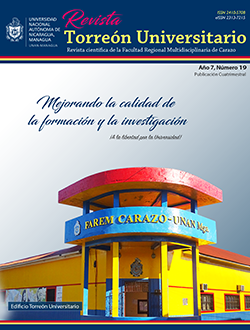Strategic planning and teaching quality in the University
DOI:
https://doi.org/10.5377/torreon.v7i19.7906Keywords:
quality teaching, educational evaluation, learning, strategic planning, teaching quality, excellence in educationAbstract
Aside from the sort of discipline or specialty, universities should promote in their students a high-level thinking and make them self-sufficient trainees.
Quality teaching is defined as that which can reach teaching goals, the ones that stand out because of their ambition and complexity as to make students reach a critical thinking, be creative and develop complex cognitive skills. However, according to available information, most students of this level, will not reach these goals. It is remarked the important role of the teacher to obtain them.
Educative evaluation and particularly, that of students learning, constitutes in this context, a very interesting topic due to its importance, complexity and the validity of different problems pending to be solved.
The searching of high education excellence, is a current demand that compromises all those individuals implied in educative tasks, and the aspects of and components in the formation process of the future professionals. In our country that search shows in the willing of constant perfectionism of university teaching based on scientific support, which back up the decisions and day by day chores of educative institutions and promotes, at the same time, pedagogical investigation development as a necessity of the perfection itself.
Strategic planning in a higher education institution is a continuous process, technical-political, systematic, reflective, participatory, critical and self-critical, instructive, flexible, comprehensive and guidance, which promotes change, and precedes and presides the action for the decision making.
Downloads
Downloads
Published
How to Cite
Issue
Section
License
Los autores que publican en esta revista están de acuerdo con los siguientes términos.
- El autor o los autores de los artículos, ensayos o investigaciones conceden a la Universidad Nacional Autónoma de Nicaragua, Managua (UNAN-Managua) los derechos de edición (copyright) del trabajo enviado, por consiguiente la Universidad cuenta con el derecho exclusivo para publicar el artículo durante el periodo completo de los derechos de autor.
- Estos derechos de autor/ autores autorizan a la Revista Torreón Universitario y a la Universidad editar y divulgar/publicar el artículo en dicha Revista, incluyendo reproducción impresa y electrónica, el almacenamiento, recuperación y cualquier otro tipo de publicación, y fuentes de información secundaria como servicios de resúmenes y bases de datos, así mismo la facultan a proteger el artículo contra el uso no autorizado para su difusión por medios impresos o electrónicos (PDF, HTML, EPUB, XML u otros).
Licencia para el uso del contenido
La revista hace uso de la Licencia Creative Commons Atribución-NoComercial-SinDerivar 4.0 Internacional.
Bajo esta declaración:

Este revista está sujeta a una licencia de Creative Commons Reconocimiento-NoComercial-SinObraDerivada 4.0 Internacional. Puede ser copiada, distribuida y transmitida públicamente siempre y cuando se cite al autor y la fuente (Revista Torreón Universitario), no debe modificarse ni utilizarse con ningún fin comercial. La licencia completa se puede consultar en http://creativecommons.org/licenses/by-nc-nd/4.0/.

